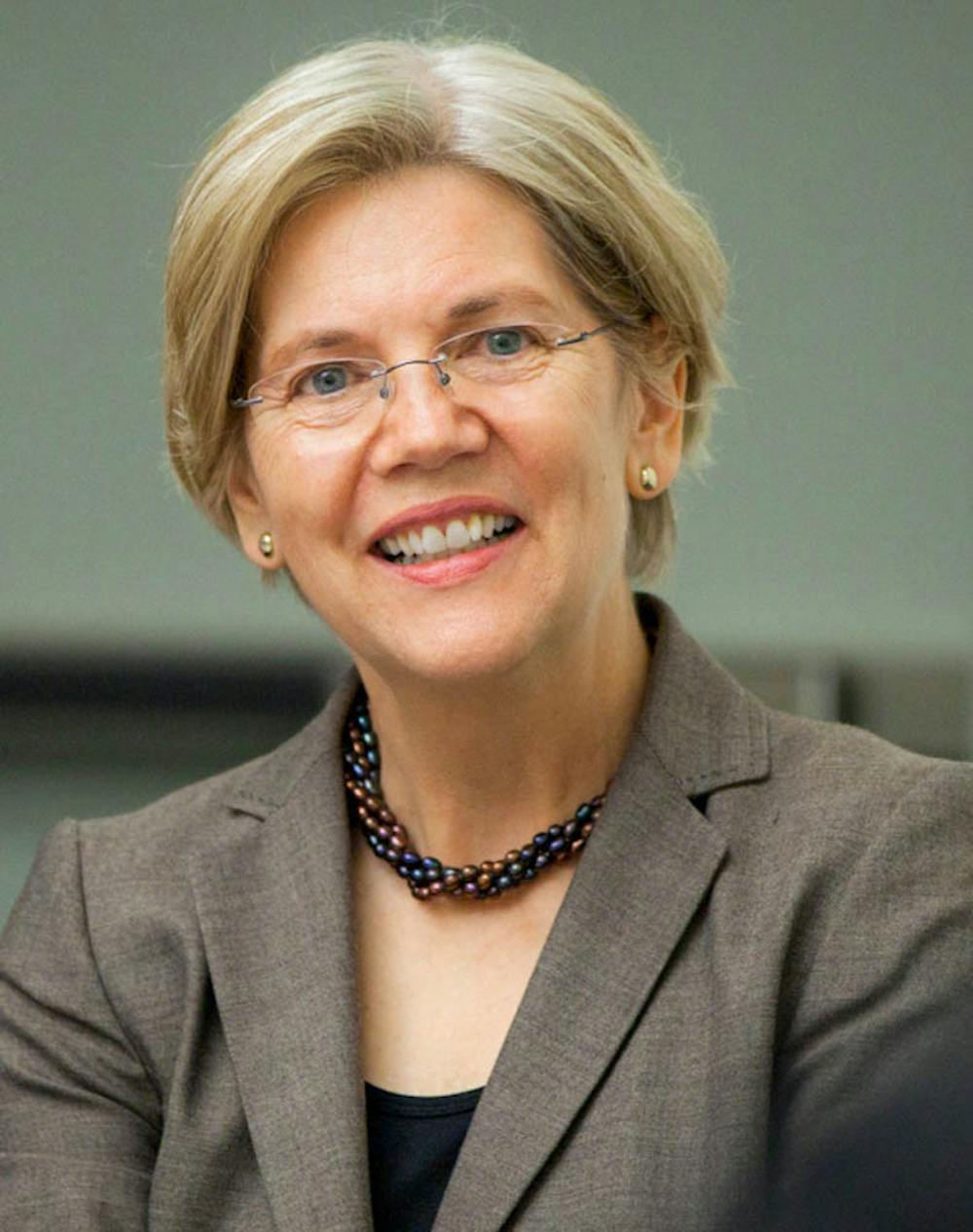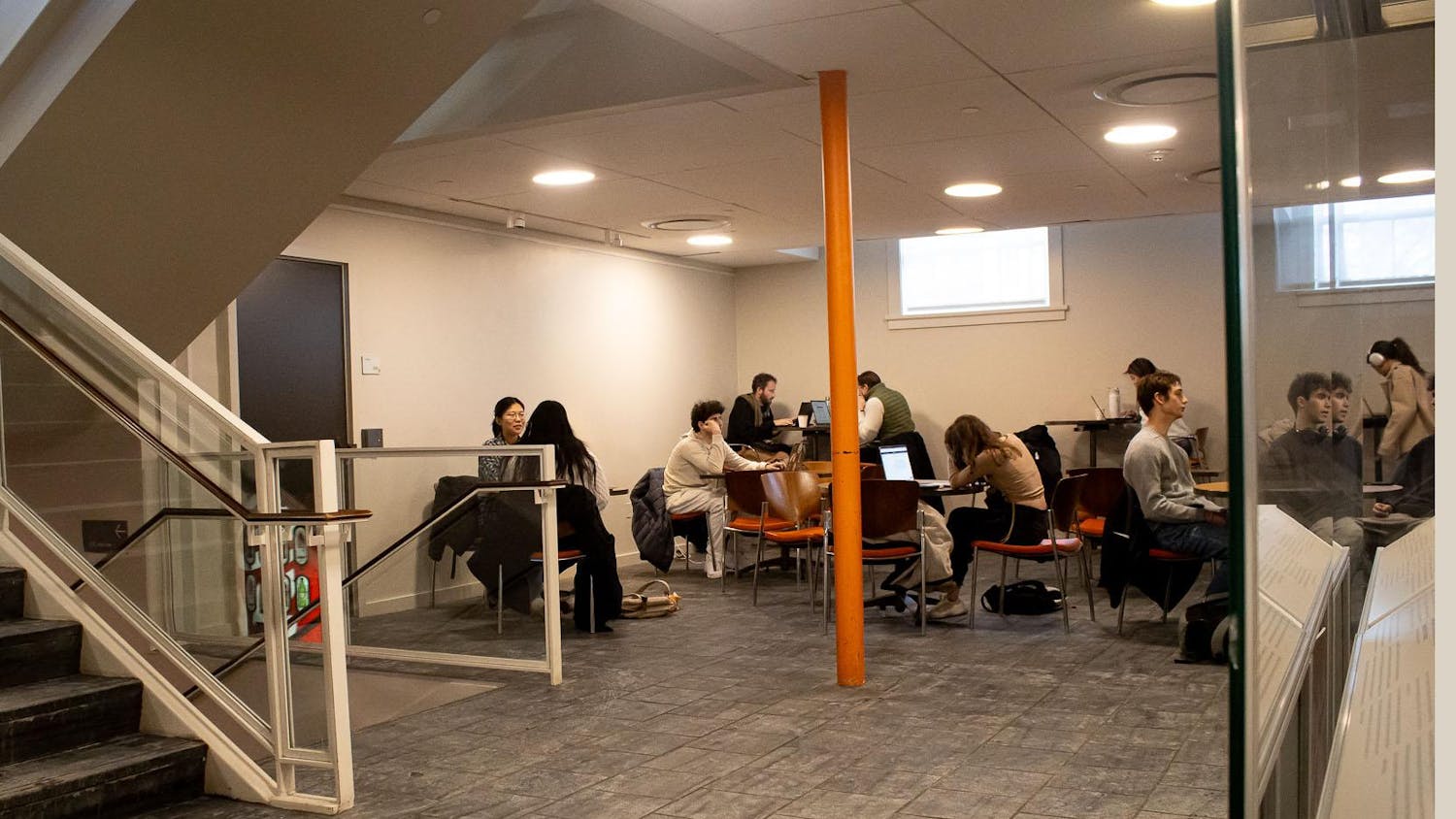Her father had a heart attack when she was young, leaving him unable to work and forcing her mother to get a minimum-wage job answering phones at Sears to support her family. Though her family lived paycheck to paycheck, she embarked on a path that led her to become the senior U.S. senator from Massachusetts and a potential contender for president in 2020. Sen. Elizabeth Warren (D-MA) delivered the Governor Frank Licht ’38 Lecture Wednesday to a packed audience, where she juxtaposed the lack of economic opportunity in America today against her own middle-class upbringing.
“That minimum-wage job saved our home, and it saved our family,” Warren said. “My mother got a minimum-wage job at a time in America when a minimum-wage job would support a family of three. … Today, a minimum-wage job in America will not keep a mama and a baby out of poverty.”
Sen. Sheldon Whitehouse (D-RI), who won his bid for reelection Tuesday, introduced Warren. “There is no one in the United States Senate who sees more clearly or feels more passionately the problem of a political system that has been rigged,” he said.
The lecture was televised by ABC6 and photographed by the Providence Journal after the University rolled back its “pencil press” media policy for the event. The University was initially criticized for planning to limit press coverage of Warren’s talk, The Herald previously reported.
Warren focused her lecture — titled “Government for the Few” — on how policy shifts at the federal level since 1980 have increasingly enriched the wealthy to the detriment of middle-class and working families.
“It’s not only the minimum wage,” Warren said. “It’s how much risk has been shifted away from corporate America and business America, and how much has been shifted to the individual, to the little family.”
The prevailing political philosophy of deregulating markets and expecting income growth among the rich to trickle down to the poor began with the administration of President Ronald Reagan in 1980, Warren said. This marked a sharp reversal from the New Deal policies of President Franklin Roosevelt, which had dominated U.S. politics since the 1930s, she explained.
Under Roosevelt’s leadership during the Great Depression, “the fundamental question was — can government help? Is there anything government can do?” Warren said. “Regulation is part of how we make this economy work.”
Since 1980, the U.S. government has worked in the interests of corporations rather than people, Warren said. She blamed rising income inequality on decades of conservative policies that gave tax cuts to the rich at the expense of public investments — like education, infrastructure and research — that benefit everyone.
This policy shift did not occur because people wanted it, Warren explained. “It’s not like a bunch of Americans woke up one day and said, ‘Damn that government that works for all of us,’” she joked. Instead, Warren attributed the government’s tilt toward protecting business interests to extensive lobbying and campaign contributions from rich individuals and large corporations.
But support for a progressive government that helps its people get ahead is growing again, Warren said. “We just had an election yesterday, and here’s the part that gives me hope: There are a whole lot of new Democrats coming in.”
Speaking to reporters after the event, Warren addressed the Democrats’ loss of seats in the Senate. “Of course I’m worried about what it means to lose Senate seats, and those were also colleagues,” she said. “But the Democrats also took back the House, and that means that we are really in a position to move legislation that matters for hardworking families.”
Warren expressed optimism that Democratic control of the House of Representatives will push the government to take an active role in putting middle- and working-class interests above corporate interests.
After delivering her lecture, Warren answered questions submitted online by students. One student asked why Warren chose to take a DNA test to confirm her distant Native American heritage, a controversial move criticized by James Flynn ’20 in his Oct. 26 column in The Herald.
“You may know Donald Trump has attacked me for a long time now based on my ancestry,” Warren said. “My response to attacks is just to try to be as transparent as possible. I put out 10 years of my tax returns, I put out every single one of my hiring records and documents that we can lay hands on, and yeah, I took a DNA test. And I put it all out on the internet. Anybody can see it. They can make of it what they want.”
Warren emphasized that she is not a citizen of any Native American tribe. “Only tribes determine tribal citizenship,” she said. She also recognized that the information she released would not placate President Trump.
“I am not going to keep Donald Trump from hurling racial insults,” Warren said. “I am not going to be able to stop Donald Trump from trying to turn Americans against each other. But I think this is a time when we have a choice to make as Americans, and it’s whether or not we’re going to go to our corners or whether or not we’re going to pull together.”
Students in attendance who were interviewed by The Herald expressed dissatisfaction with Warren’s response to the issue of her DNA test. “She dodged it a little bit,” said Aneeqah Naeem ’20. “I’m interested to hear her speak more about it.”
Warren’s answer “was a bit standard,” agreed Bilal Memon ’22. “I would have appreciated perhaps a little more clarity (and) straightforwardness.”
But students lauded Warren for delivering an informative and substantive lecture that touched on complex topics ranging from the housing crisis to the income gap between black and white Americans.
“I’m really glad she spent so much time delving into a lot of the economic gaps that we see,” Naeem said. “I love that she talked about the racial wealth gap and housing segregation, because those are things that I think are often missed when we talk about economics.”
“During the question-and-answer period, I think she did a good job succinctly explaining her policy positions,” Memon added. “I thought she was a brilliant speaker.”
Warren’s lecture “inspired me to recognize that change can be made in U.S. society,” said Alexandra Chukwumah ’19. “As a young generation — as Brown students — we shouldn’t lose hope.”
When asked by a reporter whether she might announce a run for the presidency, Warren said, “We need a government that works for everyone. That’s where I’m focused right now.”





